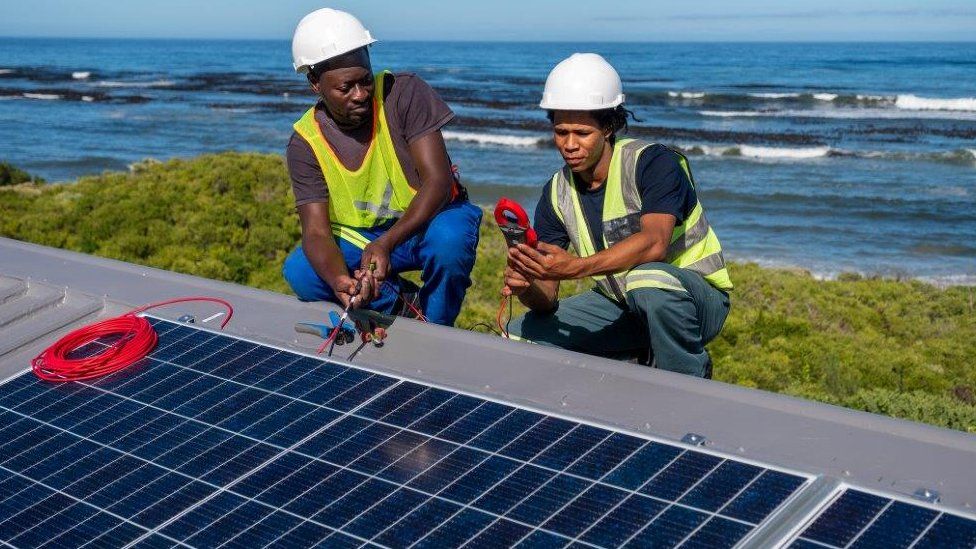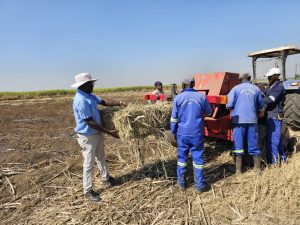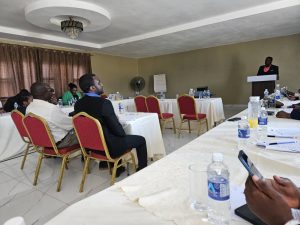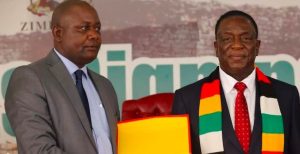Claude Kabemba
Answering this question is critical to finding a sustainable solution to the challenges that the continent faces to secure a just energy transition. This question raises another question: how quickly can Africa make the transition to renewable energy?
Climate change is presenting itself as probably the most difficult challenge facing Africa in the coming decade; it has the potential to derail or reverse the continent’s path to development.
Africa is witnessing the worst impact associated with global warming, with phenomena such as droughts, floods, and cyclones.
Climate change impact is already costing African economies between 3- 5 percent of their GDP. As climate change worsens, it will increase the resource crunch and human migrations, and will lead to more conflicts between African people as they compete for scarce resources.
Climate change is an obstacle to Africa’s ability to develop in a sustainable manner. Although it is the lowest polluter (contributing less than 4 per cent to global CO2 emissions), it has been argued that Africa has no option but to stop its emissions.
Fifty-four African countries have ratified the Paris Agreement and drafted the Nationally Determined Contributions (NDCs) and National Adaptation Plans (NAPs) as part of their commitment to reduce emissions and adapt to climate change. However, despite this commitment, the question remains is Africa ready?
In 2009, as part of the Paris Agreement, developed nations committed to support climate change adaptation and mitigation activities in developing countries to the tune of US$100 billion a year until 2020.
They agreed to support the implementation of just transitions that promote sustainable development, poverty eradication, and the creation of decent work and quality jobs. It was argued that “Africa’s vulnerability to climate change creates a compelling case for it to receive significant funding for adaptation.” To date the developed countries’ promises have not materialized.
The total adaptation finance being provided by developed nations remains far below the scale necessary to respond to existing and future African climate change challenges.
Most African countries have been neglected by international climate finance support. Western commitment has been fading away despite the symbolic gesture shown at COP26 when South Africa received US$8.5 billion (to support its transition from fossil fuel) and the Democratic Republic of Congo (DRC) received US$500 million (to protect its forests).
In the case of South Africa, The Just Energy Transition Partnership (JETP) is not clear how the investment will be implemented. For the DRC, the funds could be managed by international organisations on behalf of the DRC government.
The DRC has already made a U-turn on its commitment threatening to extract oil and gas in its tropical forest. The finance reaching African countries is nowhere near enough to meet the continent’s needs, especially for immediate adaptation measures.
Recent analysis like the one from the World Bank’s latest Africa’s Pulse report estimates that sub-Saharan Africa will require about $30 billion to $50 billion each year over the next decade to finance investments in climate adaptation.
UNEP’s Adaptation Gap Report (UNEP, 2021) estimates that annual adaptation costs in developing economies will be in the range of US$155 to 330 billion by 2030. While it is difficult to make sense of these figures, under the current circumstances Africa will not raise this amount.
Despite a generally accepted conclusion that Africa faces challenges and needs finance commensurate to its challenges, support from the developed countries has not been forthcoming.
Also, these amounts are far too insufficient to compensate for stranded assets. The pledges should consider the order of the magnitude of the potential economic damage from redundant assets.
It will not be fair for developing countries in general, and for Africa in particular to see the advent of stranded assets as de facto public good.
The reality is that western countries have the finances, but they are simply not willing to support Africa. Ukraine is projected to received more than 65 billion in aid this year as a response to the disruption caused Russia’s war.
It means the West have the finances and are simply not prepared to support Africa. Despite an increase in approved finance in absolute terms, Africa has received only a small proportion of new adaptation finance to date. Africa might be committed to the energy transition but lacks the tools, finances, and technology to act on this commitment.
Commitment without capacity is futile. In the short to medium term, the only way for Africa to make the change to green energy is with financial and technological support from the developed countries.
What should Africa do now that the West is showing reluctance to finance clean energy? It is weakness to believe that developed countries will fully finance Africa’s energy transition. Since independence, the West’s promises to help Africa with its development have been an illusion.
The West’s approach in their cooperation with Africa has never been to cure the disease but rather to keep the continent as a permanent patient that needs continuous support. There is no sign that developed countries are this time prepared to be fair and just towards Africa, even though Africa is a victim of their pollution. It is not surprising therefore that “… funding that is currently delivered is far from fulfilling the demonstrated adaptation needs of Africa.”
The discussion on energy transition continues to reflect the old global aid architecture, where the most powerful lead the negotiations and decide when and how certain actions should take place.
This is reflected in the way developed countries have treated the issue of financing Africa’s energy transition. The bulk of EU [European Union] climate finance to Africa comes in the form of loans. This is problematic because it means the EU can profit from climate change, a problem which it contributed to creating.”
It is increasingly apparent that Africa-West relations on energy transition will not work if they are driven by a neoliberal financial system built on extensive subsidies, externalisation of costs, and corruption. We cannot achieve a just transition using neoliberal tools. “The real struggle for Africa, it seems, is how to overturn the capitalist patriarchal system promoted and protected by the global financial institutions, corporations, and the global elite who want to control and direct the trajectory of the energy transition based on profit, further marginalisation, and poverty.
Africa will need to assert the fact that it is a victim of developed countries’ bad energy policies over centuries, and that the funding promised to Africa should not be seen as an act of charity or philanthropy but as fair reparation for the damage done.
Hear all Voices: a people-centred just energy transition.
The International Energy Agency estimates that out of Africa’s 1.4 billion people 600 million people are still without electricity and 1 billion have no access to clean cooking energy. Lack of access to electricity is one of the causes of poverty in Africa.
There are concerns that this poor population could again be left out as we make the transition to new forms of energy. Green energy powered by the sun and wind is giving hope to millions of people in Africa, because such energy of proximity, if well managed, could reach them.
It seems that there is a need to define what a just energy transition means and what it will look like in the eyes of the rural poor. Defining a just transition in the African context will allow African governments to align the NDCs to national development plans. Currently most of the NDCs are simply wish lists with no connection to national development plans.
There are concerns about how Africa can achieve a just energy transition within a system that does not include the voice of poor, mostly rural populations, who are also the most exposed to climate change impacts.
Generally, at the climate talks, the voices of those most affected by the climate crisis, especially women and young people, are not part of the conversation despite recent overtures to the youth climate movement.
There are fears that without the poor and marginalised taking part in the energy transition discussions to advance and protect their rights to access energy and define how they would like to access it; they will simply be excluded in the same way that the current economic system has excluded them.
Any energy transition negotiations that do not include the people’s voice will not be just and fair. They run the risk of reproducing the current energy model that excludes most people.
The bulk of EU climate finance to Africa comes in the form of loans. There is a need for a power shift where people (and not the market) become the drivers of the change, and the designers of how energy transition should happen and how resources should be distributed.
When it is the market that drives the energy transition, it creates a gap between governments and the grassroots and increases corporate capture of African governments and public institutions. These constitute serious obstacles to the securing of climate justice for African people.
A just energy transition in the perspective of most Africans is about a balanced approach that encourages collaboration, compromise, and willingness to consider all sides of an argument. It is about putting people at the centre of the transition.
It is a transition that does not leave anyone behind socially or economically. As such, energy transition in the African context is not simply a move away from one source of energy to another; it is an opportunity to establish fairness and justice in the distribution of economic benefits, including access to electricity.
The president of Senegal and president of the African Union, Macky SALL, recently suggested that “We must reach an agreement on a fair energy transition for Africa and this discussion must take place in Sharm el-Sheikh [in Egypt].”
The question is how would African elites even know what a fair and just energy transition is when they have not engaged with the poor and the excluded to hear their position?
Most African leaders will enter COP27 without having consulted sufficiently with the people who they purport to represent — the rural poor who are most directly affected by climate change.
These are the people who must define what a just energy transition means and looks like. Solving the climate crisis will require leaders to consider all perspectives, including those of the marginalised.
For most African communities who have never had access to electricity, telling them about clean energy sounds superfluous — what they want is access to energy now.
Free prior and informed consent (FPIC) becomes relevant in the context of the energy transition. FPIC will provide an opportunity for public and social control of the transition to renewable energy by community-based cooperatives.
A people-centred approach will ensure that the benefits and costs involved in the transformation of our energy system are distributed fairly and in a way that protects the most vulnerable in society.
Therefore, the long walk to a just energy transition requires mass education of African people and policymakers, the vigorous assertion of people’s rights, and the search for real alternatives, including changes to social and political structures and systems.
Africa is the continent with solutions to the climate change crisis. First, Africa has the second largest tropical forest (in the DRC) with a peatland that holds 30 billion tons of CO2.
Second, Africa captures 40 percent of world solar radiation (although only 1 percent of solar energy capacity is in Africa).
Third, Africa has great potential to generate wind energy both on land and sea. And fourth, Africa has the power to produce all transition-critical minerals (cobalt, lithium, manganese, etc…).
It does not make sense that people who are the owners of all these resources are deprived of full access to energy and the economic benefits it brings.
Since the energy transition is currently being driven by capital, there is a high risk that the pursuit of benefits for a few will dominate the discourse and that poor people will be left out again.
A people-centred energy transition will therefore not happen without a fight, where people’s movements will have to stand up and demand equity in the distribution of the benefits of green energy.
For this to happen communities must develop a shared understanding of the pertinent issues on energy transition to be able to propose collective community actions.
The only way to circumvent capitalism is for communities to turn the energy transition into one of their struggles to demand a complete change of the current economic system. Capitalism has been extraordinarily destructive.
The demand is for a new growth model which will avoid the failures of the current system. The community struggle will have to be orientated towards replacing a system that has damaged the environment and increased inequality and poverty.
The energy transition is an opportunity to rethink economic strategies. There is a need to force those currently driving the energy transition in Africa and globally to recognise the strategic importance of working with communities, listening to them, learning from them, understanding their needs, and working together to find solutions.
Communities must demand and agitate for redress, justice, and equity. The point this paper makes is that a just transition must be built on an inclusive, participatory, and democratic process with communities as key stakeholders.
Community activism is critical to challenge existing power relations and to mobilize for a radically just transition.
With increasing mobilisation and education happening at ground level, African people are saying that a people-centred energy transition is only possible when people’s voices are heard and included in the solutions.
This is a Southern African Trust publication authored by Claude Kabemba






